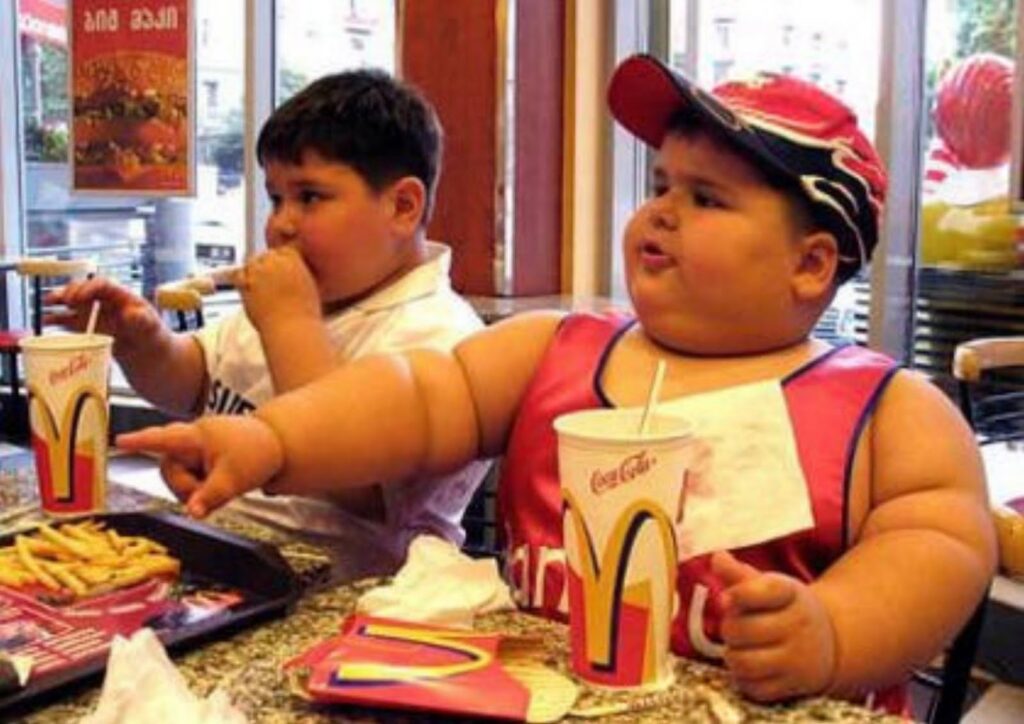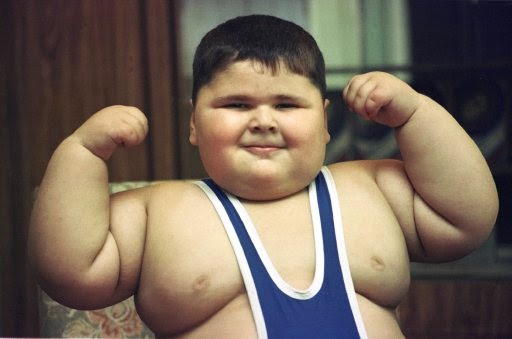On this site, I have reiterated multiple times why being fat is awful — physically, mentally, and spiritually awful.
Now, in the era of fat acceptance and body positivity adjacent movements, childhood obesity is on the rise across the world.
Easy availability of fast food, high-fructose-corn-syrup-laden sodas, and poor-quality processed school meals have wrought havoc on the leaders of tomorrow.
Add a sedentary digitalized lifestyle into the equation, with a dash of overstressed and sometimes permissive parenting, and you have a recipe for disaster.
And although some parents consider their acceptance of their portly children’s poor diet choices as an act of affection, they are setting up their children for disaster. An under-enjoyed childhood due to fat-related immobility; a turbulent adolescence; and an ailing adulthood are to be expected.
Why are kids getting fatter?
- Less exercise
- Sedentary lifestyle
- Fast food prevalence
- Poor dietary knowledge in parents
- Calorie Dense sugary and/or fatty snacks (often cooked in vegetable oil)
- Less parental discipline
- Family breakdown
- Stress eating
- Normalization — and sometimes, glorification — of obesity
Very few are the chubby kids that experience a truly happy or accepting childhood outside of their household.
Overeating is a refuge; it is a mechanism to destress; it is an addiction; it is a lack of discipline imposed by one’s parents; it is a dereliction of one’s parental duties to protect their child’s health.
Promoting obesity is one of the most bizarre social crazes in our topsy-turvy day and age. Telling a morbidly obese person that they look stunning in a revealing outfit may temporarily raise their dopamine levels, but in the long run serves little more than to reduce their quality of life within a shortened lifespan — you’re not trendy, you’re cruel; you are lying to this person and continuing to play into their delusions.
Don’t believe me… well, I drafted a list of 50 reasons why it absolutely SUCKS to be fat.
So, let’s start from the get-go, shall we?
Social Issues

I wanted to begin with the social and psychological reasons why I believe allowing your child to be fat is one of the cruelest things you can do — aside from actual direct abuse. Although you may not be directly abusing your child, allowing your child to become obese is an indirect form of abuse.
A lot of fat kids have a hard time getting along with their peers.
There are no upsides to being fat from both a health-conscious perspective and a social perspective.
From being picked last for academic assignments or sports teams due to their cumbersome bulk, they may become undersocialized and socially awkward from a young age, thus precluding them from forging high-quality, trusting relationships across a wide range of fields.
When your child grows into their adolescence and early adulthood, they may experience hardship in bonding with the opposite sex due to self-esteem issues or isolation from their peers.
This can lead to significant problems later in life, holding your child back from ever reaching their full potential.
A fat kid is often socially relegated to form friendships with children who aren’t exactly popular — as more popular children might feel a certain reluctance in being associated with their chunkier peer.
As a result, the fat kid struggle to form important relationships with peers when it comes to business or other similar endeavors.
Being an ex-fat kid myself, I was very spoiled — my parents had a hard time telling me “no” whenever I wanted something; usually a calorie-dense treat.
Being spoilt also negatively affects your social standing among your peers. Nobody — and I do mean nobody — appreciates a spoilt person.
They are unequivocally unpleasant to be around; a spoilt attitude is nothing but a hindrance.
And of course when the fat kid’s poor social development spectacularly backfires, the fat kid can lick his wounds and seek refuge in sugary snacks and enabling parents who conflate love with wrecking their child’s health.
Low Self-Esteem
A fat kid and low self-esteem is very much a cliché; they go together like bread and butter, coffee and cream, fish and chips, bangers and mash — sorry for pulling out some very Anglocentric examples.
Low self-esteem isn’t something that is remedied overnight.
It can take years, a lifetime, or, more often than not, forever to heal.
Again, low self-esteem ties in with poor social skills and deliberately setting up obstacles to their success. And this self-limiting can hamper their ability to find an appropriate partner, decent group of friends, or self-exclude from success in the business world.
Like with being fat, there are virtually no redeeming features in having low self-esteem either.
While others may cheer on the fat kid to lift their spirits, a lot of the time it is inauthentic.
Eating Disorders/Self-Image Issues
Low self-esteem from being obese/overweight can morph into body dysmorphia or eating disorders. Issues with one’s shape can cause psychological and physical problems if left unchecked.
Discipline Issues
Having to relearn portion control and healthy diet models later in life may be challenging if gluttony has always been the norm. The former fat kid may be susceptible to relapsing (I put on a ton of weight 5 years ago during a very stressful period of my life).
Discipline is something that often doesn’t come naturally. When the opposite behaviors are rewarded — in the form of a cozy dopamine hit from gorging on junk food, for example — discipline becomes a very difficult behavior to instill — especially considering there are no authoritative when the fat kid has flown the nest: who teaches the fat kid discipline when he/she is independent?
Physical Problems
Let’s talk about the myriad physical problems associated with obesity/being overweight.
Thankfully, these problems can be rectified, but the psychological conditioning necessary to face something requiring as much willpower as losing fat may be lacking.
Dieting
Without discipline, dieting to lose weight or meaningfully maintain a healthier body composition is impossible.
Discipline is the foundation to any healthy diet.
We are all subject to slipping up — even the freakiest shredded bodybuilder.
The difference is, most either have the discipline do a mini-cut (short diet) or get back on the horse and slowly lose the weight put on by, say, a long Christmas Holiday with a lot of festivities.
If you’ve already fallen prey to the clutches of overeating, it’s easy to fall back into a groove of overeating.
Remember, the number one best tip I could ever dispense is to not get fat in the first place.
Why Dieting Might be Harder?
Somebody who started out lean, but gained weight later in life, should have an easier time losing their paunch than somebody who has been fat their entire life.
Why?
(No, it’s not “genetics” — well, maybe, a little, but marginally.)
Firstly, due to built-in habits — discipline.
Old habits die hard and there’s a reward feedback loop tied to overeating for comfort.
Shoveling buckets of ice cream and pizza is pleasurable and offers a temporary release from anxiety.
But when the fleeting reward subsides, there’s nothing left but regret and an expanding waistline.
Secondly, there will inevitably be some degree of leptin and/or insulin resistance — which will make it harder to lose weight.
Somebody who has been fat their entire life will have a higher “set point” at which the body recognizes as a comfortable or ideal body fat percentage.
Sadly, that “set point” can be 25%, 30%, 40%, or even 50% bodyfat and beyond.
While ideally, your body should be sending you signals to “stop eating” once you’ve ingested enough food to maintain sufficient energy levels, leptin resistance can mean overeating even though the body has consumed more than enough.
This is partly the reason why you can sometimes see morbidly obese individuals complaining of hunger pangs after eating an enormous meal.
Getting beneath that set point can be challenging as the body will strive to hold on to adipose tissue to restore homeostasis.
This is why, sometimes, when dieting, you can begin with tremendously success only to slow down and hit a brutal plateau.
And while the only way to lose weight is to be in a prolonged caloric deficit, the body may lower your base metabolic rate to maintain said “set point.”
This is where frustration sets in; you’re eating at what you’d consider to be a caloric deficit, doing cardio, avoiding refined carbs to keep your blood sugar levels relatively stable, but the scales don’t budge.
What do you do then?
The answer should either be 1) persistence and patience or 2) a reverse diet to reset your base metabolic rate.
But mainly fail to take this route.
Instead, they end up dropping their calories to unsustainable levels and doing excessive amounts of cardio to dig their bodies into a deeper deficit to keep losing bodyfat.
But if you’re eating 1600kcals and doing 2-3 hours of cardio a day, what happens when you can’t get below 30% bodyfat?
You give up.
Instead of intelligently reassessing your diet, you go back to bad habits.
Ghrelin (the hunger hormone) will inevitably win out — even against the steeliest of willpowers, eventually.
Which is why…
Thirdly, a yo-yo dieting groove may be set into motion.
And this is the second worst case scenario behind remaining fat and continuing to pile on the pounds unabated.
More often than not, issues concerning body image will arise within a child who’s overweight from a young age.
Extreme self-image problems beget extreme — and extremely temporary — solutions.
By extreme solutions, I mean adhering to an unassailable pattern of yo-yo dieting, which can lead to a whole array of physical and mental problems.
Metabolic damage is simply one of the various health complications that can arise from yo-yo dieting; while anxiety/depression/eating disorders are psychological problems that can stem from violent weight fluctuations.
Physical Unfitness

Kids should be kids.
And no kid should suffer an undesirable condition.
No kid wishes to be fat.
And kids are kids — it’s up to the parents to regulate what goes into their bodies, not the kid.
No kid should be out of breath by walking up a flight of stairs. No kid should be picked last in gym due to their size.
Part of childhood should be enjoyed exploiting that abundant energy to play outside for hours and to explore.
Being immobile due to obesity is a cruel punishment to dish out on a child.
That very immobility could also be subduing their ability to form friendships and to come into their own as a person.
Other children also don’t want to be hindered by the chubby kid that can’t keep up or can’t go out.
Disease
I’m going to cut right to the chase — one of the best ways to curtail chronic inflammation is to drop some poundage.
Chronic inflammation has been linked to almost every single disease, from heart disease to a variety of cancers.
And let’s be frank here; how many obese over-60s do you see walking around?
Obesity is almost 100% avoidable, yet it is possibly the commonest condition to significantly reduce quality of life.
Obesity isn’t expressive, beautiful, rebellious, or whatever other airheaded adjective you can assign to it — obesity itself is a disease.
It’s an unpleasant disease.
But, as I’ve already mentioned, it’s a very curable disease.
Most parents hate being told how to raise their kids. Parents recoil and become primordially defensive whenever their parental foibles are pointed out. But speaking from the perspective of a former fat kid — and one who went through a lot of suffering and rude awakenings from my hyperglycemic childhood daze — being fat is something that no child should go through as it will affect them for their entire life.











